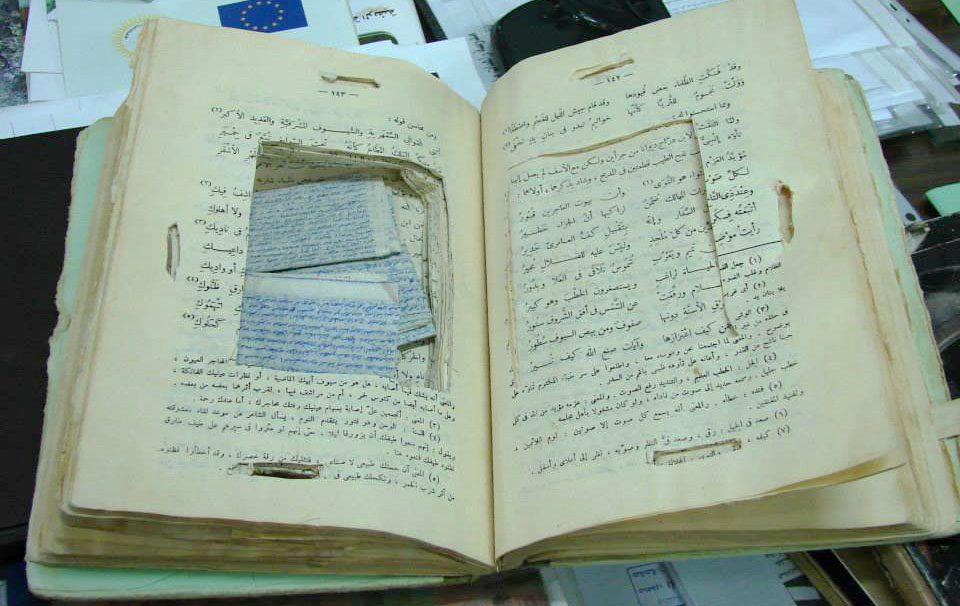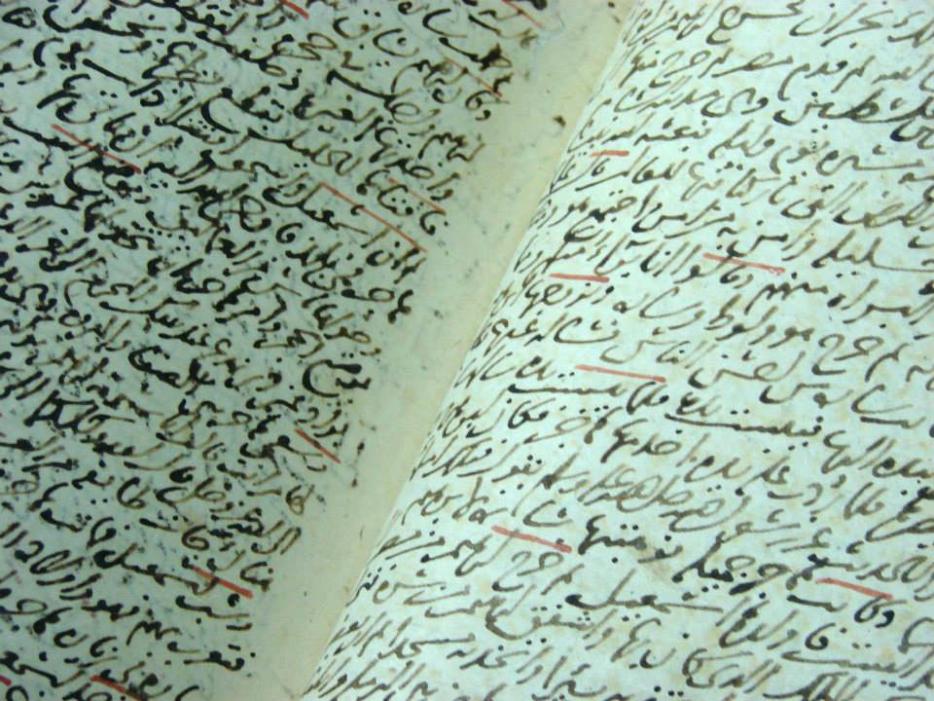Jasmine bushes grew along the road I walked to the Palestine Writing Workshop each morning. Their white blossoms, like stars against the dark green leaves, waited until dusk to release their perfume. I’d catch their fragrance only after the sun set, blood red, over the Mediterranean. I passed mulberry bushes, too, that dropped their fruit on the roadside and were mashed beneath my sandals. And I passed the olive trees whose leaves change colour during the day from green, to silver, to grey. At the end of the road, Birzeit’s taxi drivers waited to take students to Birzeit University, which stood on a nearby hilltop, or all the way to Ramallah.
I climbed up from the taxi park, past the post office that sells stamps featuring a portrait of poet Mahmoud Darwish. I passed the grocery store where I bought fresh green figs and olive oil in recycled water bottles, and the dusty café where—like all such cafés in Palestine—every man greets everyone else the moment he steps inside. When I reached the top of the hill, I’d pause for a breakfast of hot falafel and pita from a sandwich shop before stepping inside the old stone home where I spent a July as writer-in-residence.
The Palestine Writing Workshop encompasses a library filled with books in both English and Arabic, a few small offices and a sunny conference room with bare, whitewashed walls and old windows with swinging shutters. Workshop staff and visitors use the kettle on a hallway shelf to soak Lipton tea bags or dissolve spoonfuls of Nescafé. The powdered coffee tastes like chemicals. Morgan, the PWW coordinator, was a fellow coffee snob who mercifully shared her French press and precious stash of fresh ground beans.
Only one of the ten writers registered for my creative nonfiction workshop, which I titled “Telling the Truth,” was a man. He never showed up. Of the nine remaining students, three were Americans married to Palestinian men. (Although Bettye’s husband had recently passed away.) The rest were young Palestinian women. I suspect all were in their early to mid-twenties, but I have a hard time judging the age of women who wear headscarves. At first, only one, Yara, was not a hijabi. The Palestinians had studied English at one time or another—a prerequisite for the class since I cannot speak Arabic.
I wanted to see if and how this story would manifest in my students’ writing, but I didn’t want to influence what they chose to write about. I didn’t want them to think I expected stories about checkpoints or the “separation wall” or their grandfather’s uprooted olive trees. I wondered how many, if given the chance to write about whatever they wanted, would retell the same Occupation narratives.
The Americans showed up on time for my first class; the Palestinians all arrived late. We gathered around a table in the conference room and introduced ourselves. I lectured about writing creative nonfiction for a little while and watched as they scribbled in their notebooks. We did a couple of rudimentary writing exercises, then I gave them an assignment for the following week. “Write a scene from your life,” I instructed, telling them they could write about whatever interested them. I deliberately avoided mentioning the Occupation.
In his book Occupation Diaries, Palestinian author Raja Shehadeh describes attending a historian’s lecture about the Nakba—the word, meaning “catastrophe,” that Palestinians and their supporters use to describe the founding of the state of Israel in 1948. Shehadeh writes:
As I sat listening once again to all the details of what happened, I wondered whether I would ever tire of hearing about and seeing films on 1948 and the Nakba. It is like Shahryar, the king in A Thousand and One Nights who can never tire of listening to Scheherazade. We continue to be bewildered and wonder how it could have happened, why it happened, how it can be explained and understood. We can never have enough of it.
I wondered what it meant to be so chained to a single narrative, to endure a sort of Sisyphean curse to hear and retell the same stories of oppression, exile and occupation over and over again.
I first visited the region at the end of 1999. I’d travelled to Jerusalem because I wanted to be somewhere interesting when the clock turned on the new millennium. I’ve returned to Israel and Palestine many times since then, both as a writer and a traveler, and although my understanding of the Occupation increased with each visit, I always saw the Palestinians in this same context of anger and deprivation. Like most outsiders—regardless of which side of the conflict our sympathies lie with—this was the only narrative I’d ever heard. Palestinians had been simplified by a seemingly unending struggle. They are characters in a single story.
I wanted to see if and how this story would manifest in my students’ writing, but I didn’t want to influence what they chose to write about. I didn’t want them to think I expected stories about checkpoints or the “separation wall” or their grandfather’s uprooted olive trees. I wondered how many, if given the chance to write about whatever they wanted, would retell the same Occupation narratives.
Their stories started to arrive by email a few days after class, and I forwarded each piece to the other participants to read. Many were accompanied by apologies and disclaimers that betrayed a lack of confidence in their own work—a common phenomenon in writing workshops. Bettye feared her story was “contrived.” Nora, another of the Americans, apologized for narrowly exceeding the arbitrary five-hundred-word limit I imposed. Dina wrote to say she’d composed two stories for the assignment, but didn’t like either of them. “Plus I think that I’ve done them wrong,” she continued. “I understood the assignment, but this understanding plays hide and seek with me. It vanishes when I’m writing and when I’m done it pops up to say that I didn’t do it right.” Hana was less poetic with her self-criticism:
Dear Marcello,
Here is my poorly written piece of nonfiction.
Have a nice day,
Hana
Bettye described spending a summer in an old wooden house her father was disassembling plank by plank. Dina wrote about the day her little brother wandered off during Friday prayers at Jerusalem’s al-Aqsa mosque. They eventually found him. Donna, the third American, wrote about ice hockey, of all things, and I teased her for pandering to her Canadian instructor. Yara wrote a charming piece about eating ice cream in the winter as a child, a mild rebellion that shocked her classmates. “Very few things fail to surprise Catholic school girls,” she wrote. Heba wrote about how her family lived in her father’s pharmacy for six months during the Second Intifada to avoid having to pass back and forth through Israeli checkpoints. Nora described a conference of international aid workers she attended, Kefah wrote about a night spent in Jordan before a family holiday to Puerto Rico and Mariam wrote about trip she made to Bolivia with her parents. Mariam’s story was the weakest. Her English was tentative, and I worried that she would not be able to keep up with the others.
Hana’s story, however, was the most striking. In it, she describes challenging her conservative father’s authority and religion. Early in the piece her father tells her, “I will give you some orders that you have to follow without even arguing, because, lately, I notice you are deviating from the right path.” Hana resists him. Tempers flash. He threatens to “enslave” her. She accuses her father of forcing her to wear the veil and treating her like a possession. He throws tea at her, calls her scum, and yells “I cannot allow the existence of a heretic in my family.” Then, after Hana cries that she hates him, her father turns to Hana’s mother and says “Bring me a knife. I want to slaughter her.”
I’d spent less than a week “in residence” and already I was out of my league. I didn’t know how to respond to Hana’s story. As an outsider, I didn’t know whether I had any right or responsibility to address the abuse Hana described. I didn’t even know how to react to her bravery, her willingness to share this experience with the group. Instead, in a page of notes I would share with her the next class, I retreated into the comfortable mush of writing workshop conventions. I critiqued her use of adjectives and the formality of her dialogue, and suggested she slow her pacing. I recommended she add more physical details to the scene, hoping the request didn’t sound perverse.
The group met again the following weekend. Hana was late and we all talked about her story while waiting for her to arrive. The piece had made everyone nervous: some of the other students couldn’t believe that she had written it. When Hana finally came into the room, she was not wearing her hijab. Her hair hung long and straight to her shoulders and her bangs were cut into a severe line just above her eyebrows. I sensed a collective gasp when she appeared, but no one said anything until we finished discussing her story. Then Nora leaned forward and asked, in Arabic, “When did you stop wearing hijab?” Hana told us she abandoned the veil earlier in the week. She had been considering doing so for awhile, but writing the story finally compelled her.
I didn’t understand the full weight of what had occurred until I spoke with Nora after the class. She told me that abandoning the veil was a serious rebellion in Palestine. It is one thing to have never worn hijab, and many young Palestinian women don’t, but to jettison one’s headscarf as an adult is seen as a conscious and deliberate rejection of one’s faith. Many in the community would consider Hana’s decision scandalous. While so-called honour killings of disobedient women are rarer in Palestine than elsewhere, they still occur—and for lesser transgressions that Hana’s. We’d read about her father’s temper and his threats, and we all worried about her.
In the wake of Hana’s story and the drama surrounding her rejection of the hijab, it took me a few days to recognize that only one of the women, Heba, wrote about the Occupation. Even her story, despite having the Second Intifada as its setting, was more about her relationship with her little brother than about the conflict. My students’ assignments provided my first glimpses of a complete Palestinian life. Until then, I’d only viewed Palestinians through the lens of the struggle: through journalism, activism and political discourse.
After reading my students’ stories, I wanted to see the Palestinian experience from a different starting point. Not one apart from the struggle—I’d seen enough to know that that Occupation saturates nearly aspect of Palestinian existence—but a starting point that exists alongside of the conflict. Since I was a writer, and a writer-in-residence, the bookshelves of Palestine seemed as good a place to start as any.
*
The Nablus Municipal Library keeps the prisoners’ books in a room on the third floor. After the establishment of the Palestinian Authority in 1996, the Israelis closed two of their military detention centres in the West Bank: the Jnaid and Nablus prisons. PA officials gathered together all the books from the prison libraries—about 8,000 printed books and 800 notebooks—and collected them here.
Morgan, the PWW coordinator, introduced me to two Palestinian sisters, Beesan and Zeina Ramadan, who lived in Nablus and offered to bring me to the Prisoners’ Library. Most of the books were written in Arabic, and Zeina translated the titles for me. A large number discussed Marxism and socialist economics. In the 1970s and 1980s, the decades when most of these books would have been read, many Palestinian independence groups found inspiration in left-wing ideology. Political factions within the prison held classes where they discussed strategy and introduced socialist philosophy to novices. The librarian on staff showed me the notebooks they left behind. I noticed the handwriting was exceptionally precise—almost puritan in its neatness. These were not the notebooks of ham-fisted thugs. Many political prisoners of the time were students who wanted to keep up with their studies while in prison, hence the textbooks and dictionaries. Others had been educated abroad and gave foreign language lessons to their fellow inmates.
The librarian waved me over and lifted a thick hardcover book out of her desk. She opened it to reveal a secret compartment hollowed out of the centre, and said the book had been used to smuggle messages back and forth between prisoners. Slots cut adjacent to the compartment allowed the pages to be clipped together just enough so a guard could thumb through the pages without discovering the inner cavity. The hollow contained a stash of messages written on paper peeled from the backs of cigarette foil. The delicate paper retained a scent of tobacco. The words themselves were handwritten and nearly too tiny to read.
Other books described the struggles of subjugated people elsewhere in the world. “The Palestinian movement has always felt connected to other independence movements, especially during the 1960s and 1970s,” Beesan said. The prisoners found a solidarity with their co-oppressed and sought inspiration and lessons from their histories. I found a historical account of America’s destruction of its native peoples, and a workbook dedicated to the Namibian independence movement. I also found a tattered book of songs about Nelson Mandela—himself a prisoner at the time—with both English and Arabic translations. Someone had written diacritical marks in pencil over the Arabic lyrics to indicate proper pronunciation, evidence that prisoners did not simply read the words but sung them aloud. I imagined a group of Palestinians, standing in their prison clothes, singing songs for a fellow political prisoner in a distant African cell.
Beesan and Zeina’s father, Mahmoud, was himself imprisoned in Jnaid for his political beliefs. He read many of these books, and told his daughters that if they searched the volumes carefully, they might find his handwriting in the margins. “This is what I am looking for,” Zeina told me. “This is part of who I am.” As she flipped through books she guessed her father might have read, Zeina showed me some of the writing other prisoners had added. She found a couple lines of a Darwish poem scribbled in one book. Simple drawings of flowers and trees in another. The Palestinian flag rendered in blue ink. Passages underlined in red or notes made in margins. Following Zeina’s lead, I did the same, and searched the spaces between the printed text for the ink of men we can know no other way than by the hieroglyphs they left behind.

The librarian waved me over and lifted a thick hardcover book out of her desk. She opened it to reveal a secret compartment hollowed out of the centre, and said the book had been used to smuggle messages back and forth between prisoners. Slots cut adjacent to the compartment allowed the pages to be clipped together just enough so a guard could thumb through the pages without discovering the inner cavity. The hollow contained a stash of messages written on paper peeled from the backs of cigarette foil. The delicate paper retained a scent of tobacco. The words themselves were handwritten and nearly too tiny to read.
Holding the hollowed out book in my hands and gently unfolding the messages gave me a sort of forbidden thrill. I imagined a prisoner in his cell, peeling the paper backing—slowly, slowly—from the cigarette foil. I imagined him with a cheap ballpoint in his hand, his head resting cheek down on the table to bring his eyes as close to the paper as he can. The movement of the ballpoint over the paper is barely discernable except to his cramping fingers. He writes tiny words about Marx and revolution and borders. About independence and other dreams. Entire manifestos and calls to action on paper as thin as a moth’s wing. When he is done, he wipes the ache from his eyes. He folds the paper twice, glances up from the table, and places the message in the hollowed-out middle of the book the other prisoners gave him. He closes the book and returns it to the prison library, his letter concealed inside.
The librarian told me that similar letters were also smuggled out of the prison. Inmates about to be released wrapped the tiny papers in cellophane saved from their cigarette packages, then used a match to melt the cellophane around the messages to form a rough capsule. The men then swallowed the capsules just before leaving the prison. Most of these messages were letters from factions inside the prison to their supporters outside, but sometimes released prisoners swallowed personal messages and love letters from inmates to their wives and families.
The prisoners, the readers of these books and the men that Beesan and Zeina so admired, starved themselves so they could read, then swallowed and smuggled the words they’d written. In a place where ideas are forbidden, words themselves become a valuable contraband.
Excerpted from chapters one and four of Song of the Caged Bird: Words as Resistance in Palestine.




